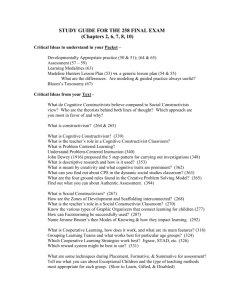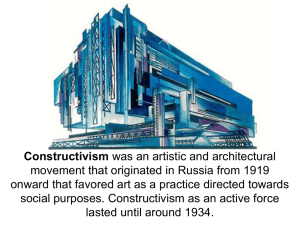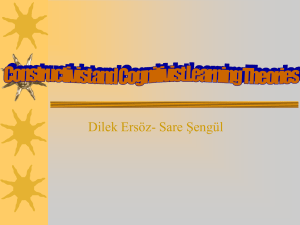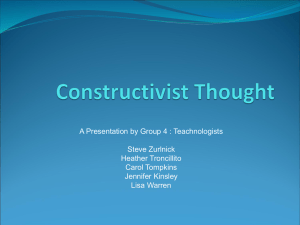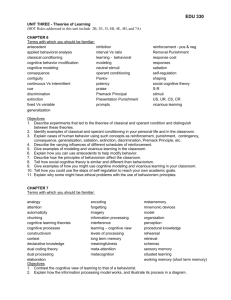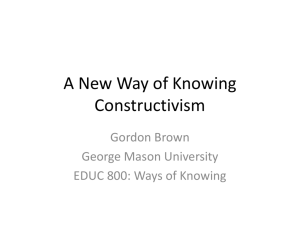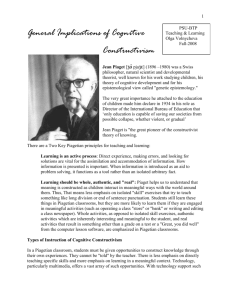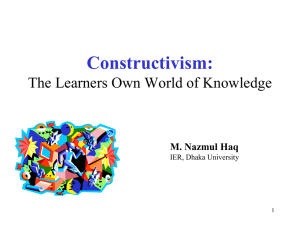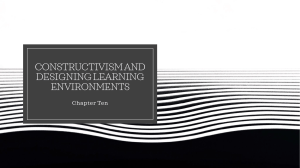Constructivism
advertisement
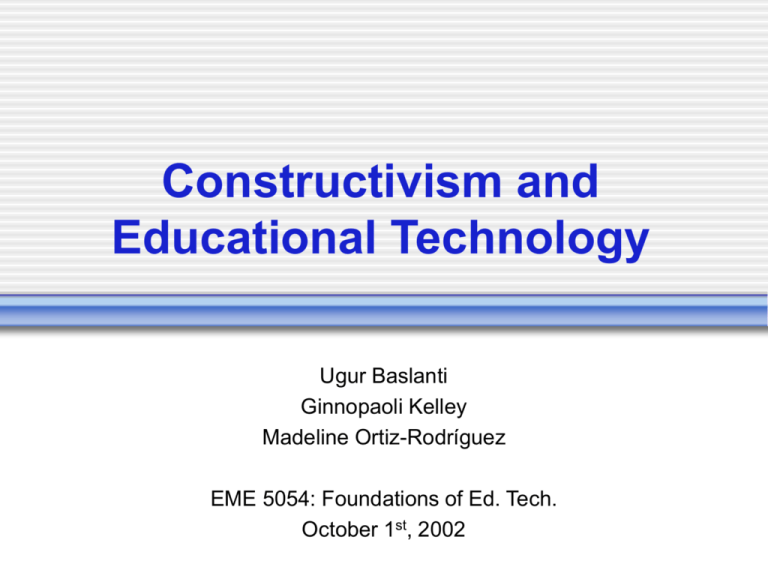
Constructivism and Educational Technology Ugur Baslanti Ginnopaoli Kelley Madeline Ortiz-Rodríguez EME 5054: Foundations of Ed. Tech. October 1st, 2002 Behaviorism and Learning (Antecedent) Stimulus Response (Consequence) •Learning is a change of observable behavior due to experience. •Learning is accomplished by doing, experience, trial and error. (Skinner, 1938) Behaviorism and Educational Technology (Antecedent) Stimulus Response (Consequence) •Teaching machines give immediate feedback to students. •Use of tutorials, and drill and practice SW. •Use of media: TV, films, newspapers, … Cognitive Theory and Learning Stimulus Psychological Process Response Prior Knowledge •Learning is changing mental representations. It is to construct meaning about the world and themselves. •Learning is accomplished by the cognitive processes: Information Processing, Symbol Manipulation (Visual Literacy) and Knowledge Construction. Cognitive Theory and Educational Technology Stimulus Psychological Process Response Prior Knowledge •Use of intelligent tutor systems, expert systems, interactive multimedia environments, virtual reality. •Technology is used to go beyond direct instruction. Metaphors of the Mind Mind as a computer: -- Knowledge is a matter of storage and retrieval. Mind as a brain: -- Knowledge is a function of distributed connections and network activations. Constructivists: Historical Predecessors Vico Giambattista Jean Jaques Rousseau John Dewey Jerome Brunner Historical Predecessors Vico Giambattista (1668 - 1744) Italian “… to know means to know how to make” Getting away from memorization and recitation Reference: http://www.connix.com/~gapinton/ Historical Predecessors Jean Jaques Rousseau (1712-1778) born in Switzerland and died in France. “emphasized learning by doing” Teachers should present problems that stimulate curiosity and promote learning. Reference: http://www.wabash.edu/Rousseau/ Historical Predecessors John Dewey (1859-1952) American “… education is not preparation for life it is life itself …” Focus on inquiry-based learning Teachers as providers of tools, materials, appliances,… Teachers will guide the learning process. Reference: http://www.siu.edu/~deweyctr/ Historical Predecessors Jerome Bruner (1915- ) American Theory of Instruction: predisposition, structured knowledge, sequence, and pacing rewards and punishments. Instructional methods: Discovery Learning, Inquiry, Experimentation, Observation, Interviewing, Literature search, Summarizing, Defense of opinion References: http://www.massey.ac.nz/~i75202/lect14/lect1499.htm, http://tip.psychology.org/bruner.html Historical Predecessors Alfred North Whitehead (1861 to 1947) born in UK and died in US Education is being able to use knowledge. Reference: http://www-groups.dcs.stand.ac.uk/~history/Mathematicians/Whitehead.html Constructivism How does it fit in? Constructivism • Content, activity and learning is seen as a whole. • Learning is an active process that occurs by: testing a hypothesis, gathering and sharing information, and solving a problem. • “… learning … is a process of active cognitive reorganization.” • “… learning … is a process of acculturation … Constructivists: Two Schools of Thought Cognitive constructivism: Jean Piaget Ernst von Glasersfeld Lev S. Vygosky Barbara Rogoff Socio-Cultural constructivism: Cognitive Constructivist Jean Piaget (1896-1980) Swiss • Learning is adaptation accomplished by: Acculturation Assimilation Equilibrium • Information is organized into interrelated ideas or schemas Reference: http://www.indiana.edu/~intell/piaget.html Cognitive Constructivist Ernst von Glasersfeld • Radical Constructivism Our subjective experiences interact with our previous knowledge to construct new knowledge. Reference: http://www.oikos.org/vonen.htm Socio-cultural Constructivist Lev Semenovich Vygotsky • Zone of proximal development (Zo-ped) • Mediators of human actions in order to construct meaning Technological tools Psychological tools • Importance of culture and historical experience • Experience of others 1897-1933 Reference: http://www.massey.ac.nz/~i75202/lect17/lect1799.htm Socio-cultural Constructivist Barbara Rogoff • “.. learning requires the active involvement of the learner” • importance of collaborative learning • developing learning communities Reference: http://www.newswise.com/articles/2001/10/LEARN2.UCS.html Students • Will develop cultural understanding so that they can: communicate adequately develop collaborative skills develop content knowledge The Instructor Is viewed as a guide, manager, coach or tutor. Help students develop thinking and reasoning skills: Problem solving Metacognition Critical thinking Challenge learning by asking questions such as: Why? What do you mean? How do you know that’s true? Avoid giving the answer or opinion. Constructivism and Educational Technology • Technology as: “a tool for the learner.” “an integral part of the cognitive activity.” Mindtools* * Jonassen, David H. (2000). Computers as Mindtools for Schools: Engaging Critical Thinking. (2nd. Ed.) NJ: Merrill. Assessment • Tests generated by student’s learning: Multiple choice, essays, short answer • • • • • Peer and self-evaluation Portfolios Performance Assessment Authentic Assessment Dynamic Assessment Compatibility • Seeking compatibility in order to: understand others point of view understand learner’s thinking map knowledge Mind as Rhizome • Knowledge cannot be organized as a global system. • The mind is dynamic, constantly changing. • Thinking takes place through connections and interactions. Metaphors we teach by • • • • • • All knowledge is constructed. Multiple perspectives can be constructed. Learning should occur in contexts to which it is related. Learning is mediated by tools and signs. Learning is inherently social-dialogical activity. Learners are distributed, multidimensional participants in a socio-cultural process. • Knowing how we know is the ultimate human accomplishment. Instructional Methods • Discovery Learning • Zone of Proximal Development • Scaffolding • Cognitive Apprenticeship • Coaching • Context is a Dynamic Whole • Learner Control Not teacher-control Not computer-control • Assessment • Collaborative Learning • Computers and Media To conclude … “The end of human activity is not rest, but rather richer and better human activity.” Rorty (1991), p. 172 Duffy, T.M. and Cunningham, R. J. Constructivism: Implications for the design and delivery of Instruction. In: Jonnasen, D. (Ed.) Handbook of research for educational communications and technology (170-198).
